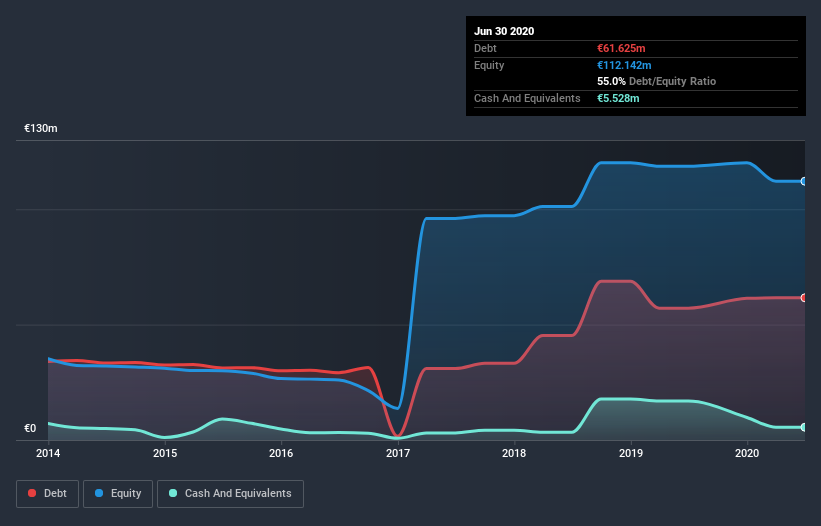
Howard Marks put it nicely when he said that, rather than worrying about share price volatility, 'The possibility of permanent loss is the risk I worry about... and every practical investor I know worries about.' It's only natural to consider a company's balance sheet when you examine how risky it is, since debt is often involved when a business collapses. Importantly, Seri Industrial S.p.A. (BIT:SERI) does carry debt. But the real question is whether this debt is making the company risky.
When Is Debt Dangerous?
Generally speaking, debt only becomes a real problem when a company can't easily pay it off, either by raising capital or with its own cash flow. If things get really bad, the lenders can take control of the business. However, a more frequent (but still costly) occurrence is where a company must issue shares at bargain-basement prices, permanently diluting shareholders, just to shore up its balance sheet. Of course, debt can be an important tool in businesses, particularly capital heavy businesses. When we think about a company's use of debt, we first look at cash and debt together.
Check out our latest analysis for Seri Industrial
What Is Seri Industrial's Net Debt?
The image below, which you can click on for greater detail, shows that at June 2020 Seri Industrial had debt of €61.6m, up from €57.1m in one year. However, because it has a cash reserve of €5.53m, its net debt is less, at about €56.1m.

How Strong Is Seri Industrial's Balance Sheet?
According to the last reported balance sheet, Seri Industrial had liabilities of €124.7m due within 12 months, and liabilities of €45.9m due beyond 12 months. On the other hand, it had cash of €5.53m and €52.2m worth of receivables due within a year. So it has liabilities totalling €112.9m more than its cash and near-term receivables, combined.
This deficit is considerable relative to its market capitalization of €163.6m, so it does suggest shareholders should keep an eye on Seri Industrial's use of debt. Should its lenders demand that it shore up the balance sheet, shareholders would likely face severe dilution.
We use two main ratios to inform us about debt levels relative to earnings. The first is net debt divided by earnings before interest, tax, depreciation, and amortization (EBITDA), while the second is how many times its earnings before interest and tax (EBIT) covers its interest expense (or its interest cover, for short). This way, we consider both the absolute quantum of the debt, as well as the interest rates paid on it.
Weak interest cover of 0.13 times and a disturbingly high net debt to EBITDA ratio of 18.9 hit our confidence in Seri Industrial like a one-two punch to the gut. This means we'd consider it to have a heavy debt load. Even worse, Seri Industrial saw its EBIT tank 86% over the last 12 months. If earnings keep going like that over the long term, it has a snowball's chance in hell of paying off that debt. There's no doubt that we learn most about debt from the balance sheet. But ultimately the future profitability of the business will decide if Seri Industrial can strengthen its balance sheet over time. So if you're focused on the future you can check out this free report showing analyst profit forecasts.
Finally, while the tax-man may adore accounting profits, lenders only accept cold hard cash. So we always check how much of that EBIT is translated into free cash flow. Over the last three years, Seri Industrial saw substantial negative free cash flow, in total. While that may be a result of expenditure for growth, it does make the debt far more risky.
Our View
To be frank both Seri Industrial's conversion of EBIT to free cash flow and its track record of (not) growing its EBIT make us rather uncomfortable with its debt levels. And even its net debt to EBITDA fails to inspire much confidence. Taking into account all the aforementioned factors, it looks like Seri Industrial has too much debt. That sort of riskiness is ok for some, but it certainly doesn't float our boat. Even though Seri Industrial lost money on the bottom line, its positive EBIT suggests the business itself has potential. So you might want to check out how earnings have been trending over the last few years.
At the end of the day, it's often better to focus on companies that are free from net debt. You can access our special list of such companies (all with a track record of profit growth). It's free.
If you decide to trade Seri Industrial, use the lowest-cost* platform that is rated #1 Overall by Barron’s, Interactive Brokers. Trade stocks, options, futures, forex, bonds and funds on 135 markets, all from a single integrated account. Promoted
New: Manage All Your Stock Portfolios in One Place
We've created the ultimate portfolio companion for stock investors, and it's free.
• Connect an unlimited number of Portfolios and see your total in one currency
• Be alerted to new Warning Signs or Risks via email or mobile
• Track the Fair Value of your stocks
This article by Simply Wall St is general in nature. It does not constitute a recommendation to buy or sell any stock, and does not take account of your objectives, or your financial situation. We aim to bring you long-term focused analysis driven by fundamental data. Note that our analysis may not factor in the latest price-sensitive company announcements or qualitative material. Simply Wall St has no position in any stocks mentioned.
*Interactive Brokers Rated Lowest Cost Broker by StockBrokers.com Annual Online Review 2020
Have feedback on this article? Concerned about the content? Get in touch with us directly. Alternatively, email editorial-team@simplywallst.com.
About BIT:SERI
Seri Industrial
Through its subsidiaries, engages in the production and recycling of plastic materials for battery, automotive, hydro-thermo-sanitary, civil, and shipbuilding markets.
Fair value with limited growth.
Market Insights
Community Narratives



